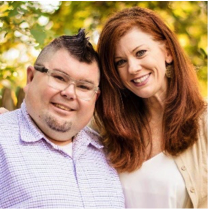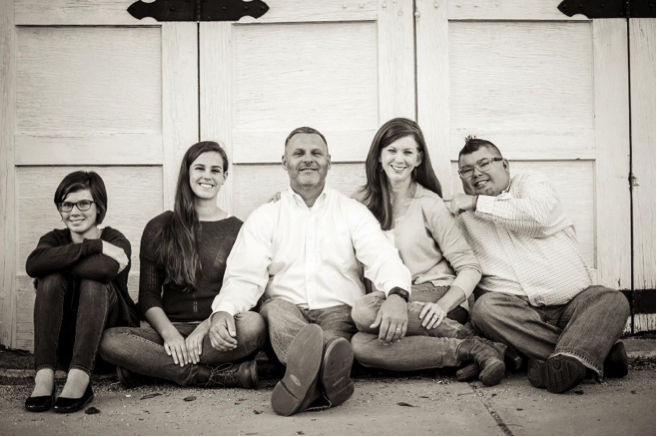Building Partnerships to Serve
The time is always right to do what is right. – Martin Luther King, Jr.
Engaging in community service is a win-win scenario. For community organizations, volunteers with disabilities represent a group of eager and active people who want to help improve their community. For disability organizations, supporting inclusive volunteering serves our mission to promote the inclusion of people with IDD, and helps people with disabilities gain confidence and participate in their communities. In addition to volunteering being the right thing to do, supporting community service also helps chapters of The Arc develop community partnerships that can advance The Arc’s mission.
In 2015 and 2016, The Arc of the Nature Coast in Hernando and Pasco counties, Florida, received MLK Day of Service* grants to provide food assistance to people in need in their community. To accomplish this mission, the chapter reached out to two groups often affected by lack of access to food: senior groups and youth groups. The result: two win-win scenarios.
Serving Food and Building Friendships
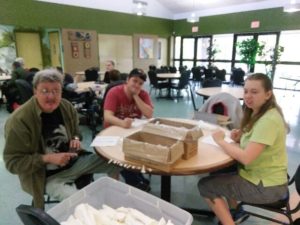 The Arc of Nature Coast partnered with Pasco Elderly Nutrition, which serves more than 800 senior citizens at three community centers in Pasco County through its Meals on Wheels program. To support this program, volunteers from The Arc Nature Coast deliver, prepare and serve food to people in need. More than this, volunteers have developed friendships with their fellow volunteers without disabilities as well as the senior citizens. In fact, after they volunteer, many volunteers with and without disabilities spend time playing cards and games at the senior centers.
The Arc of Nature Coast partnered with Pasco Elderly Nutrition, which serves more than 800 senior citizens at three community centers in Pasco County through its Meals on Wheels program. To support this program, volunteers from The Arc Nature Coast deliver, prepare and serve food to people in need. More than this, volunteers have developed friendships with their fellow volunteers without disabilities as well as the senior citizens. In fact, after they volunteer, many volunteers with and without disabilities spend time playing cards and games at the senior centers.
Feeding the Hungry and Dancing the Night Away
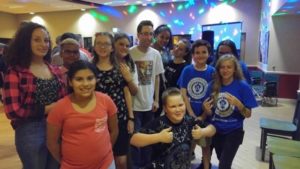 The Arc of Nature Coast partnered with the BETA Club from Fox Chapel Middle School in Spring Hill, Florida. The BETA club first got involved packaging produce for The Arc Nature Coast’s food delivery in January 2017. This club had such a good time that they began attending The Arc Nature Coast’s social events. BETA club members served food and drinks and helped clean up after events, and enjoyed dancing and socializing with people with IDD. Recently, the BETA club received a national volunteer recognition award from the BETA National School of Merit for service with The Arc Nature Coast. To celebrate this awesome achievement, they invited The Arc of Nature Coast staff and people served by the chapter and their families to their dinner dance, and hired “PJ the DJ”, a local self-advocate, to provide the music for the evening.
The Arc of Nature Coast partnered with the BETA Club from Fox Chapel Middle School in Spring Hill, Florida. The BETA club first got involved packaging produce for The Arc Nature Coast’s food delivery in January 2017. This club had such a good time that they began attending The Arc Nature Coast’s social events. BETA club members served food and drinks and helped clean up after events, and enjoyed dancing and socializing with people with IDD. Recently, the BETA club received a national volunteer recognition award from the BETA National School of Merit for service with The Arc Nature Coast. To celebrate this awesome achievement, they invited The Arc of Nature Coast staff and people served by the chapter and their families to their dinner dance, and hired “PJ the DJ”, a local self-advocate, to provide the music for the evening.
Each partnership has been a win-win scenario for The Arc, the volunteers, and the partner organizations.
Per The Arc of Nature Coast’s Development Director, Nancy Stubbs, these volunteer programs and activities have led to social inclusion, friendships, and closer community connections for volunteers and between The Arc and partner organizations.
More than this, these opportunities have also raised the community’s awareness of the chapter. The Arc of Nature Coast has only recently expanded to Pasco County, Florida, and was “virtually unknown.” Because of these partnerships and volunteer programs, The Arc of Nature Coast is making a name for itself and being known as a community leader and a server of people with IDD in the area.
Congratulations to The Arc of Nature Coast for creating these great win-win scenarios! And, for more on inclusive volunteering and how to build partnerships that serve community needs and strengthen The Arc’s presence in the community, visit https://www.thearc.org/inclusive-volunteering.
*In 2015, The Arc was selected by the Corporation for National and Community Service (CNCS), the federal agency that leads the Martin Luther King, Jr. Day of Service, to plan and execute volunteer projects that unite Americans in service for the MLK Day of Service and throughout the year. To date, 16 chapters of The Arc around the country have organized inclusive volunteer service projects where people with intellectual and developmental disabilities (IDD) volunteer alongside people without disabilities to provide food to people in their communities who are in need. In total, these projects have brought together over 1,000 volunteers to serve more than 14,000 people in need.


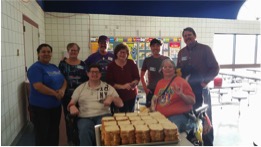 In February, volunteers with and without disabilities from TARC, the University of Tulsa’s
In February, volunteers with and without disabilities from TARC, the University of Tulsa’s 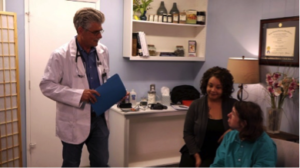 Prompted by recent news events, women everywhere are speaking up and sharing accounts of sexual violence. Social media feeds have been so inundated with tales of unwanted personal sexual encounters that it has sparked an online media campaign, punctuated by #MeToo. However, women with disabilities may face greater barriers to talking about their own experiences on social media or elsewhere. That’s why, before this hashtag went viral, The Arc’s National Center on Criminal Justice and Disability® (NCCJD®) and The Board Resource Center (BRC) teamed up to highlight the alarming rate of sexual assault among women with intellectual and developmental disabilities (IDD). Just this fall these two organizations, with the assistance of a one-year grant from
Prompted by recent news events, women everywhere are speaking up and sharing accounts of sexual violence. Social media feeds have been so inundated with tales of unwanted personal sexual encounters that it has sparked an online media campaign, punctuated by #MeToo. However, women with disabilities may face greater barriers to talking about their own experiences on social media or elsewhere. That’s why, before this hashtag went viral, The Arc’s National Center on Criminal Justice and Disability® (NCCJD®) and The Board Resource Center (BRC) teamed up to highlight the alarming rate of sexual assault among women with intellectual and developmental disabilities (IDD). Just this fall these two organizations, with the assistance of a one-year grant from 